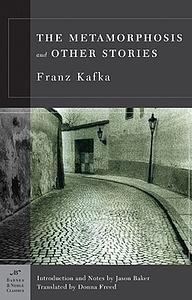You need to sign in or sign up before continuing.
Take a photo of a barcode or cover
challenging
dark
emotional
reflective
sad
I'd give anything if it means that I can know what's going inside Kafka's head when he wrote these stories.
I'm so reading Camus' works after this because of their similar themes. (and also because I read these essays: Kafka & Camus text and The Absurdity of Existence: Franz Kafka and Albert Camus.)
How can I write a widely accepted absurd story—a bit nightmarish, no clear course of action can be expected from the characters, sometimes illogical—like Kafka?
Also individual ratings:
A Message from the Emperor
The Metamorphosis
The Judgement
The Stoker: A Fragment
In the Penal Colony
A Country Doctor
An Old Leaf
A Hunger Artist
Josephine the Singer, or the Mouse People
Before the Law
Albert Camus once said that "the whole of Kafka's art consists in compelling the reader to re-read him." Since the interpretations of Kafka are many and the search for the meaning of his stories seemingly endless, the reader will return to the story itself in the hope of finding guidance from within. Thus a second reading will -hopefully - become a commentary on the first, and subsequent readings will - again hopefully - shed light on the preceding ones.
I'm so reading Camus' works after this because of their similar themes. (and also because I read these essays: Kafka & Camus text and The Absurdity of Existence: Franz Kafka and Albert Camus.)
How can I write a widely accepted absurd story—a bit nightmarish, no clear course of action can be expected from the characters, sometimes illogical—like Kafka?
Also individual ratings:
A Message from the Emperor
The Metamorphosis
The Judgement
The Stoker: A Fragment
In the Penal Colony
A Country Doctor
An Old Leaf
A Hunger Artist
Josephine the Singer, or the Mouse People
Before the Law
adventurous
dark
fast-paced
Plot or Character Driven:
Character
Strong character development:
No
Loveable characters:
No
Diverse cast of characters:
Yes
Flaws of characters a main focus:
Yes
challenging
dark
emotional
mysterious
reflective
tense
medium-paced
Plot or Character Driven:
Character
Strong character development:
Yes
Loveable characters:
Yes
Diverse cast of characters:
Yes
Flaws of characters a main focus:
Yes
How many times have I heard or read the word Kafkaesque in my lifetime? I’m not too sure, but I’m certain I’ve heard it many, many times in my life. I was well acquainted with the word long before I ever read a single word from Kafka, in fact, I’m certain I had no idea he was even an author. It is only in my recent literary ventures that I’ve become aware of this remarkable author and his work.
And so, this is my first introduction to him.
I like this anthology a lot, I can’t say for sure, but my gut feeling tells me that this is a fantastic way to be introduced to Kafka. You’re shown many of his most influential works, in the size of novella’s, novelettes, short stories & flash fiction yes. But it’s easily digestible and what’s on offer here stimulate the mind and really showcases his talents for making otherworldly stories that resonate, if not emotionally, then philosophically.
That’s what I want to say about Kafka, he has a real uniqueness to his work that I have not found in many other places. He has influenced fiction in ways that are hard to truly enumerate and appreciate.
And even 100 years later, the originals have not lost one iota of charm, rather they continue to strike powerfully if not more so today, than they have before.
This is a good anthology, one that will leave you with many things to think about.
---
As a last piece, I’ll leave my favorite stories from the collection here.
The Metamorphosis
A masterpiece of fiction, it left me deep in thought for many weeks.
In the Penal Colony
I lack the right words to convey what I feel but the perhaps the best way to describe my thoughts would be that it is otherworldly and dreamlike.
Josephine the Singer, or the Mouse People
A personal favorite in the collection, I simply have a soft spot for any story that features what one could call the ideal of an “idol.”
Before the Law
One of the best pieces of flash fiction I have ever read.
In the future I will do better to read Kafka in smaller chunks - that being said, I really love his work. The stories are very similar to the type that I write as well, and I enjoy seeing the world through his eyes.
Four stars for "The Metamorphosis," two for the other stories. A few of them (though I can't remember which ones) were intriguing, but most I just didn't get. The last, "The Penal Colony," was mostly a detailed description of an elaborate torture machine, and was difficult to listen to.
challenging
dark
reflective
sad
slow-paced
Plot or Character Driven:
Character
Strong character development:
Complicated
Loveable characters:
Complicated
Diverse cast of characters:
No
Flaws of characters a main focus:
Yes
dark
sad
tense
medium-paced
Flaws of characters a main focus:
Yes
That was the weirdest story I've ever read- it never actually tells you how Gregor turns into a giant bug and then he just kills himself by starving to death?? I know this book was written in the 1970's so it has some metaphor from back then that I'm missing being born in the early 21st century





